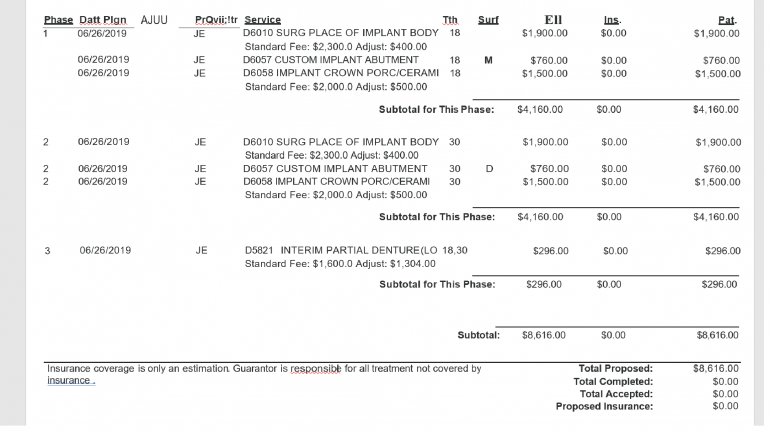
Dental Code D0170: Re-evaluation - limited, problem focused (established patient; not post-operative visit)
Dental Code D0170 refers to a specific dental procedure known as "Re-evaluation - Limited, Problem Focused." This code is used to describe an evaluation performed by a dentist on an established patient who is not visiting for a post-operative check-up.
Dental Code D0170 Price Range
As with other services, prices in America vary from dentist to dentist and city to city. The minimum charge for this service is $35 and the maximum $120. Most dentists charge around $75.
Low cost of living | Medium cost of living | High cost of living |
Memphis (Tennessee), Cincinnati (Ohio) | Miami (Florida), Denver (Colorado), Austin (Texas) | (New York (New York), San Francisco (California) |
$35 | $75 | $120 |
What Does the Code Mean?
Dental Code D0170 is used to document an evaluation performed by a dentist to assess the progress of a patient's oral health condition. This evaluation is typically conducted on existing patients who have ongoing dental issues or concerns that require re-evaluation. It is important to note that this code specifically applies to limited, problem-focused evaluations, as opposed to comprehensive evaluations that cover a broader range of dental concerns.
Patient Assessment
The re-evaluation process begins with a comprehensive assessment of the patient's dental history, including previous treatments, medical conditions, and any recent changes in oral health. The dentist reviews the patient's dental records and may also conduct an interview to gather additional information. This step helps the dentist understand the patient's concerns and determine the focus of the evaluation.
Examination of Oral Cavity
The dentist proceeds to examine the patient's oral cavity, including the teeth, gums, tongue, and other oral tissues. They may use dental instruments such as a mirror, explorer, and periodontal probe to thoroughly evaluate the patient's oral health. The purpose of this examination is to identify any existing or potential dental problems, such as decay, gum disease, or signs of infection. During the examination of the oral cavity, the dentist also assesses the patient's bite and jaw alignment to identify any issues related to the occlusion. Additionally, they may perform an oral cancer screening, checking for any abnormal growths or lesions in the mouth. This comprehensive evaluation helps the dentist develop a holistic understanding of the patient's oral health status and formulate an appropriate treatment plan.
Evaluation of Existing Dental Work
If the patient has had previous dental treatments, the dentist evaluates the condition of any existing dental work, such as fillings, crowns, bridges, or implants. They check for signs of wear, damage, or deterioration that may require further attention or replacement.
Diagnostic Tests
In some cases, the dentist may order diagnostic tests, such as X-rays, to obtain a more detailed view of the patient's teeth and supporting structures. These images can help identify hidden dental issues, such as cavities between the teeth, impacted teeth, or bone loss. In addition to X-rays, the dentist may also utilize other diagnostic tools, such as intraoral cameras or digital scanners, to capture high-resolution images of the patient's teeth and oral structures. These advanced imaging techniques provide detailed visual information that aids in the accurate diagnosis and treatment planning process. By utilizing these diagnostic tests, the dentist can detect and address dental issues that may not be immediately visible during the clinical examination.
Treatment Plan Adjustment
Based on the findings from the evaluation, the dentist adjusts the patient's treatment plan accordingly. They may recommend additional treatments, modifications to existing treatments, or changes in oral hygiene practices. The dentist discusses these recommendations with the patient, addressing any concerns and answering questions to ensure a clear understanding of the proposed course of action. In some cases, the dentist may consult with other dental specialists or collaborate with the patient's healthcare team to develop a comprehensive treatment plan. This interdisciplinary approach ensures that all aspects of the patient's oral health are addressed effectively. Furthermore, the dentist may provide oral health education and preventive measures to empower the patient in maintaining their dental well-being and preventing future issues.
Documentation and Reporting
Following the re-evaluation, the dentist documents their findings, treatment adjustments, and recommendations in the patient's dental records. Accurate and detailed documentation is essential for maintaining a comprehensive record of the patient's dental history and facilitating future treatments or evaluations. Moreover, the documentation and reporting process may involve coding the specific dental procedures performed during the re-evaluation using standardized dental codes, such as the Dental Code D0170. This coding ensures accurate communication between dental professionals, insurance providers, and other relevant parties, facilitating proper reimbursement and continuity of care. Additionally, detailed documentation enables the dentist to track the progress of the patient's oral health over time and make informed decisions regarding future treatments or evaluations.
Summary of Dental Code D0170
Dental Code D0170 represents a re-evaluation procedure performed by a dentist on an established patient who is not visiting for a post-operative check-up. This limited, problem-focused evaluation involves a comprehensive assessment of the patient's oral health, including an examination of the oral cavity, evaluation of existing dental work, and, if necessary, the ordering of diagnostic tests. The dentist adjusts the patient's treatment plan based on the findings and documents the evaluation in the patient's records. By utilizing this code, dentists can accurately communicate the nature of the re-evaluation procedure and ensure appropriate reimbursement.
Keep Your Smile in Check! Compare Prices for Re-evaluation with Dr. BestPrice and ensure the best deal for your established dental care.
